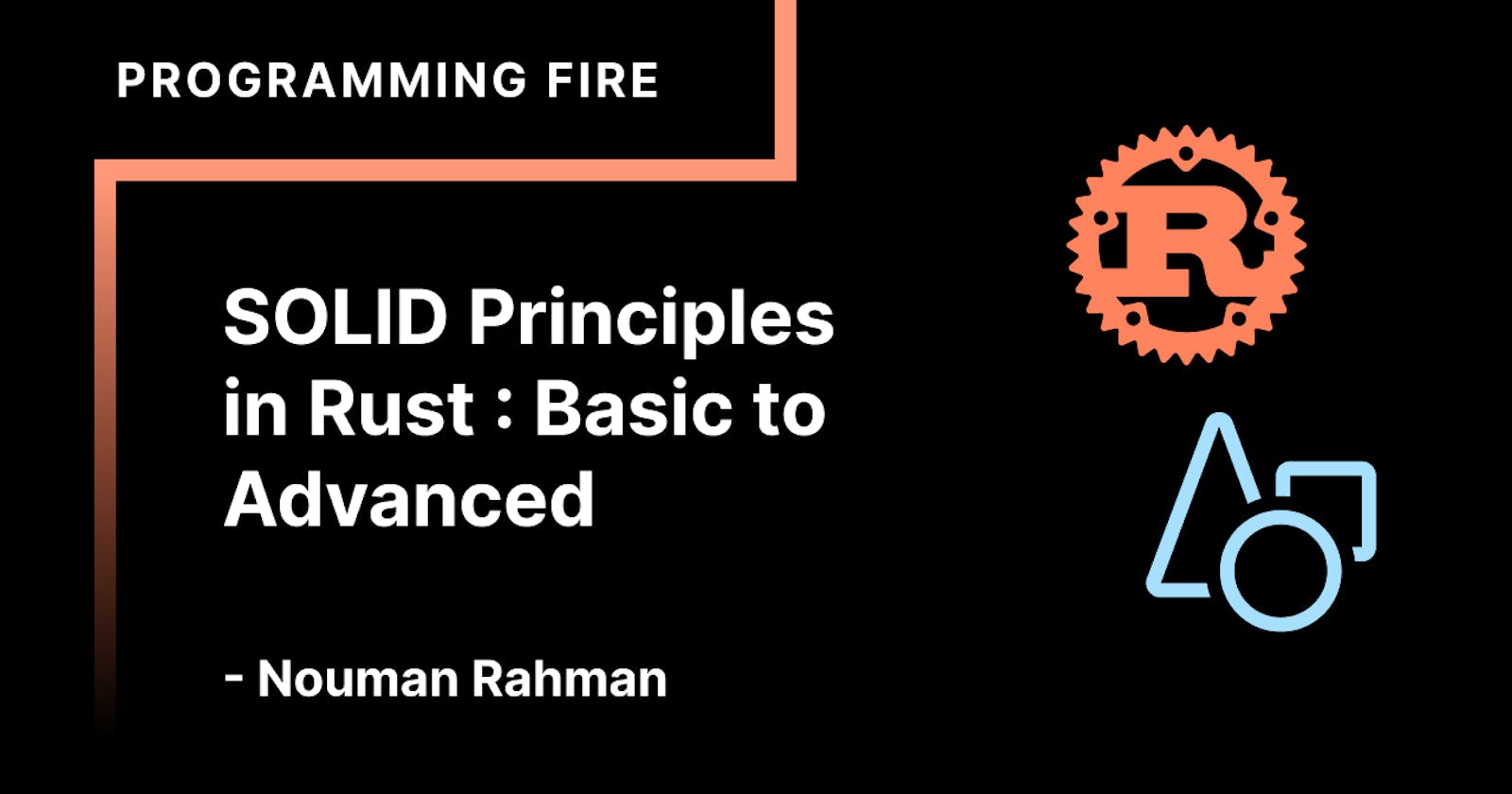Introduction
The SOLID principles are a set of fundamental guidelines for designing software that is easy to understand, maintain, and extend. These principles provide a foundation for writing clean, modular, and robust code. While initially associated with object-oriented programming, the SOLID principles can be applied to any programming paradigm, including Rust. In this article, we will explore the SOLID principles and demonstrate how they can be implemented in Rust, from basic to advanced concepts.
Single Responsibility Principle (SRP)
The Single Responsibility Principle states that a module, class, or function should have a single responsibility. It should be responsible for one and only one part of the overall functionality. Applying SRP helps improve the maintainability and readability of the code.
In Rust, you can adhere to SRP by ensuring that each module or struct has a clear and focused purpose. For example, consider a simple implementation of a file-handling module:
pub mod file_utils {
pub fn read_file(path: &str) -> String {
// Read file implementation
}
pub fn write_file(path: &str, content: &str) {
// Write file implementation
}
}
In this example, the file_utils module has separate functions for reading and writing files, each handling a single responsibility. By keeping functions focused, it becomes easier to understand and maintain the codebase.
Open-Closed Principle (OCP)
The Open-Closed Principle suggests that modules, classes, or functions should be open for extension but closed for modification. It emphasizes designing code in a way that new features can be added without modifying existing code. This promotes code reuse and minimizes the risk of introducing bugs.
In Rust, you can follow OCP by using traits and implementing them for different types. Consider an example where we have a shape module that defines a trait called Shape:
pub trait Shape {
fn area(&self) -> f64;
}
pub struct Circle {
radius: f64,
}
impl Shape for Circle {
fn area(&self) -> f64 {
// Calculate circle area implementation
}
}
pub struct Rectangle {
width: f64,
height: f64,
}
impl Shape for Rectangle {
fn area(&self) -> f64 {
// Calculate rectangle area implementation
}
}
By defining the Shape trait, we create an open system where new shapes can be added by implementing the Shape traits without modifying existing code. This allows for easy extensibility and promotes code reuse.
Liskov Substitution Principle (LSP)
The Liskov Substitution Principle states that objects of a superclass should be replaceable with objects of its subclasses without affecting the correctness of the program. In other words, derived types should be able to substitute their base types seamlessly.
In Rust, LSP can be ensured by carefully designing inheritance hierarchies and respecting the behavior of the base types. For example, consider a scenario where we have a Bird base struct and a Duck struct that inherits from it:
pub struct Bird {
pub fn fly(&self) {
// Fly implementation
}
}
pub struct Duck {
bird: Bird,
}
impl Duck {
pub fn new() -> Self {
Duck { bird: Bird::new() }
}
pub fn fly(&self) {
self.bird.fly();
}
pub fn quack(&self) {
// Quack implementation
}
}
In this example, a Duck struct inherits from the Bird struct, but it does not change or modify the behavior of the fly method. This adheres to LSP, allowing a Duck instance to be used interchangeably with a Bird instance.
Interface Segregation Principle (ISP)
The Interface Segregation Principle advises that clients should not be forced to depend on interfaces they do not use. It promotes the idea of smaller, focused interfaces rather than large, monolithic ones. This helps in reducing coupling and ensures that clients only depend on the functionalities they need.
In Rust, you can follow ISP by designing traits with minimal and cohesive functionality. For instance, consider a messaging system with two types of messages: email and SMS:
pub trait Email {
fn send_email(&self);
}
pub trait SMS {
fn send_sms(&self);
}
pub struct NotificationSystem<T: Email + SMS> {
transport: T,
}
impl<T: Email + SMS> NotificationSystem<T> {
pub fn new(transport: T) -> Self {
NotificationSystem { transport }
}
pub fn send_notification(&self) {
self.transport.send_email();
self.transport.send_sms();
}
}
In this example, separate traits are defined for email and SMS functionalities, allowing clients to depend only on the required traits. This ensures that clients are not burdened with functionalities they do not need, promoting a more flexible and maintainable codebase.
Dependency Inversion Principle (DIP)
The Dependency Inversion Principle suggests that high-level modules should not depend on low-level modules. Instead, both should depend on abstractions. It promotes loose coupling and allows for flexibility in choosing different implementations without affecting the higher-level modules.
In Rust, you can follow DIP by using traits as abstractions and depending on those abstractions rather than concrete implementations. Consider an example where we have a logging module:
pub trait Logger {
fn log(&self, message: &str);
}
pub struct Application {
logger: Box<dyn Logger>,
}
impl Application {
pub fn new(logger: Box<dyn Logger>) -> Self {
Application { logger }
}
pub fn run(&self) {
self.logger.log("Application started");
// Application logic
self.logger.log("Application ended");
}
}
In this example, the Application struct depends on the Logger trait rather than a specific implementation. This allows different logger implementations to be provided at runtime without modifying the Application code. The decoupling achieved through DIP enhances flexibility and testability.
Conclusion
The SOLID principles provide essential guidelines for writing clean, maintainable, and extensible code. While initially associated with object-oriented programming, these principles can be effectively applied to Rust. By following the Single Responsibility Principle, Open-Closed Principle, Liskov Substitution Principle, Interface Segregation Principle, and Dependency Inversion Principle, you can create code that is modular, reusable, and easy to maintain. Incorporating these principles into your Rust projects will help you build robust and flexible software that can evolve with changing requirements.
